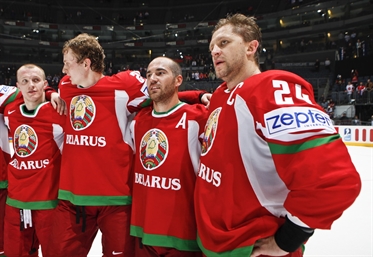Remembering Ruslan Salei
Remembering Ruslan Salei
A tribute to Belarus’s greatest player ever

 Ruslan Salei was Belarus’ captain in the 2010 Olympics and Worlds. He passed away in the Yaroslavl plane crash on 7 September 2011. Photo: Jukka Rautio / HHOF-IIHF Images
Ruslan Salei was Belarus’ captain in the 2010 Olympics and Worlds. He passed away in the Yaroslavl plane crash on 7 September 2011. Photo: Jukka Rautio / HHOF-IIHF Images
Born in Minsk in 1974, the hard-working defenceman will be recognized for his long, productive career at a gala ceremony in his hometown today. He is part of an exceptional Hall of Fame class that also includes Russia’s Vyacheslav Bykov and Andrei Khomutov, Sweden’s Nicklas Lidstrom, and Canada’s Steve Yzerman and Murray Costello.
Salei tragically passed away in the 2011 Lokomotiv Yaroslavl plane crash, along with many other hockey greats. But his memory will live on.
He accomplished more as an NHLer and international hockey regular than almost anyone could have envisioned. He grew up far away from the NHL spotlight in Belarus. Life in this former Soviet republic of 10 million hasn’t always been easy. The country suffered during the Nazi invasion in World War II, and under Communism, its eastern regions received radioactive fallout after the Chernobyl nuclear power plant accident in 1986. When you see how beautiful, clean, and green Minsk is today, it’s a tribute to the resilience of the Belarusian people.
Salei took a positive outlook while reminiscing with IIHF correspondent Lucas Aykroyd in 2007: “It was pretty good by the standards that people were accustomed to in those days. You know, I grew up in a three-bedroom apartment. At some point in my teenage life, we had me and my parents, plus my brother’s family and my sister’s family with us. But that was normal for everybody back then. People didn’t expect anything more than what they had. I wasn’t uncomfortable as I would be today due to having experienced a better life. As a kid, playing hockey served all my interests in terms of who I wanted to be. I played soccer when I was six, but I got into hockey the winter I turned seven. Then all I thought about was getting through school and playing hockey.”
Unlike some players who are inspired by the example of family members, Salei was simply motivated by the joy of hockey: “I was the only athlete in my family. My older brother played some hockey and soccer as a teenager, but he’s 12 years older than me. When I was training for hockey, he’d already moved on with his life and started working in the construction business.”
Salei built his skills year after year in the famous hockey schools of Minsk (which also briefly trained a teenaged Sergei Fedorov, among other stars). In 1992-93, he graduated to the senior team of Dynamo Minsk, competing in the Russian Elite League. Belarus had gained its post-Soviet independence in 1991, and this led to a name change for Salei’s club, which cut off its ties to the old militia in 1993-94.
“The ownership switched to a private owner, and they decided to change the name to Tivali Minsk, because they weren’t getting any financial help from the policemen of Dynamo,” Salei recalled. “Supposedly there was going to be a big arena built in this certain part of Minsk, and supposedly a hundred years ago there was a village called Tivali there. That’s why they came up with that name. Nobody really knew why when they came up with it, but that was the story.”
Salei played in Minsk through 1994-95, but it was clear to him that his development was beginning to stall in his native land. Realignments in Russian hockey pushed the Tivali club to the side. Salei needed a new place to spotlight his skills, and he found one in the most brightly lit city on earth: Las Vegas, Nevada.
Moving there was a huge gamble for a 20-year-old who had spent his whole life in Eastern Europe. But Bob Strumm, general manager of the now-defunct Las Vegas Thunder of the IHL, had enough faith in his scouts’ reports to give Salei a chance.
“He signed me without knowing me,” Salei recalled. “He gave me a chance, and that’s pretty much all you want. You take it, and you hope for the best. I made the team in my first year, and I was pretty successful that year in Vegas. I have only good memories of Bob Strumm and my coach, Chris McSorley.”
The Thunder finished first overall in the league and marched three rounds into the IHL playoffs. Salei’s teammates included NHL players like Latvia’s Sergei Zholtok, Canada’s Greg Hawgood, and Switzerland’s Paul DiPietro, to name a few. Even more remarkable was the goalie rotation, which featured six different names. Curtis Joseph, Clint Malarchuk, and Eldon “Pokey” Reddick were the most prominent ones.
“It was my first year in the States, so everything was amazing for me,” said Salei. “I mean, how many guys got to play in the IHL with Curtis Joseph? I was just enjoying myself and trying to learn as much as I could from everyone.”
Gradually, Salei picked up some English and began to settle in culturally, realizing to his amusement that not every American city had innumerable buffets and slot machines like Las Vegas. He showed he could deliver a rugged physical style, and followed up his 30 regular-season points with 10 more in the playoffs.
His efforts impressed Anaheim’s scouts. At age 21, he was relatively old to be a first-round pick. But that didn’t deter the Ducks, who grabbed Salei with the ninth overall pick in the 1996 NHL Draft, even though Central Scouting had him ranked 20th. Not long afterwards, he signed his first NHL contract, a three-year deal worth $2.25 million.
Salei split time between the Ducks and Anaheim’s AHL affiliate in Cincinnati in his rookie season, but became an NHL regular in 1997-98. However, he still wasn’t particularly well-known outside the Pacific Division until several incidents in 1998 and 1999 attracted unwanted attention.
First, he was suspended for two games for head-butting Chicago’s Sergei Krivokrasov in a February 4, 1998 fight. The only upside was that his suspension freed him up to join Belarus for qualifying play at the Nagano Olympics, and his native country made it into the final group of eight teams.
In October 1998, Salei got five games for slew-footing Phoenix’s Daniel Briere in pre-season action. And one year later, his dangerous push from behind into the boards on Dallas star Mike Modano resulted in a ten-game suspension. Although Salei expressed remorse, he was tagged as a dirty player by some opponents, journalists, and fans.
“There were tough situations for me,” Salei admitted. “People were calling me different names. You learn from your mistakes. You also learn how people react when you’re in a bad position. Who’ll give you a shoulder to lean on? And who’ll just turn away from you because you did something that is not positive for the whole society? I think it helped me grow up. That’s pretty much it.”
When Salei returned for his first home game after the Modano incident, Anaheim fans gave him a five-minute standing ovation. “It really helped to know that people believed I wasn’t trying to hurt anybody,” Salei said. “I was touched.”
Although the big Belarusian now began to rebuild his reputation as a hard-nosed but basically clean defenseman, he still didn’t get to enjoy the playoff success he craved right away. Detroit swept the Ducks in four straight games in the first round in 1999. After that, Anaheim would endure a three-year playoff drought, despite boasting perennial scoring title contenders in Paul Kariya and Teemu Selanne.
“If you want a team to accomplish something in the playoffs, you have to be all about the team, not about a couple of individual superstars and ‘the rest of the cast,’” said Salei. “That’s why we usually didn’t make the playoffs and when we did, we didn’t accomplish anything. Don’t get me wrong, Paul and Teemu are great guys. They didn’t treat anybody like they were superstars and everybody else wasn’t. Most of the hype came from the media, who put everything on their shoulders. Both of them did their best to carry that team, but you need 20 guys to do that.”
Salei saw that teamwork combined with good luck can result in miracles when he suited up for Belarus at the 2002 Salt Lake City Olympics. He’d previously competed in three top-level IIHF World Championships, and was excited when his national team beat the host Russians for the first time ever at the 2000 tournament in St. Petersburg. But upsetting Sweden 4-3 in the Olympic quarter-finals was even better. Nobody who saw that game will ever forget the winning goal. It was scored by little-known defenseman Vladimir Kopat on a shot from center ice that hit Swedish goalie Tommy Salo’s mask and trickled in with 2:24 left in the third period.
“Any team can beat any team on any given day,” said Salei. “If we played a seven-game series against the Swedes, we probably wouldn’t have beaten them. But that day, we won because they weren’t as ready as they probably should have been, and we were a little bit lucky. Our goalie Andrei Mezin played great, and the whole team played great. We just put our names into the history books.” That was true even though Belarus lost to Canada, the eventual champion, in the semi-finals.
In 2003, Salei experienced his greatest professional thrill when the Ducks marched to the Stanley Cup Finals, falling to New Jersey in seven games.
“Coach Mike Babcock made each of us accept a role and play within the system he provided, and that’s why we had that success. Of course, J-S Giguere’s play in that ‘03 run was amazing, too. Without Jiggy, we wouldn’t have gotten too far.”
Salei will always be remembered in Anaheim for scoring the overtime winner in Game Three on a slapshot after a faceoff in the New Jersey zone.
“It was an amazing feeling,” said Salei. “It kind of turned that series around, because if we’d lost, it would have been 3-0 in New Jersey’s favor. We wouldn’t have had our chance to get to Game Seven. That gave us a really good positive boost. It was the most memorable moment of my hockey career in the NHL.”
Salei put in seven more solid NHL seasons with Anaheim, Florida, Colorado, and Detroit, finishing with 204 points in 916 games. He scored a single-season career-high 32 points as an assistant captain with Florida in 2007.
He also played a big role on the World Championship squad that secured Belarus’s last quarter-final berth, finishing eighth in Switzerland 2009. And in his third and final Olympics, Vancouver 2010, he served as the Belarus captain.
Salei gave hope to an entire generation of Belarusian players that they could compete with the world’s best. It is fitting that we celebrate his legacy as the land of his birth hosts the IIHF World Championship for the first time in its history.
This article was adapted from a 2007 Rinkside feature.
Back to Overview

















































































